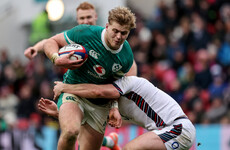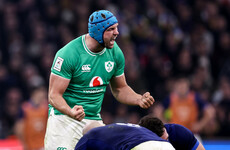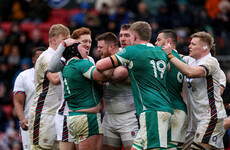THE RAIN CAME down in biblical buckets. The kind of day that makes you wonder how much of the average annual precipitation is being getting flushed at your face in any given five-minute window.
For Ireland Women, it was all hands to the pump. They held a lead over Wales, their most familiar foe, but the brunt of Storm Ciara made making sure an impossible task.
Teeth gritted, they drove on.
Adam Griggs and his team went in to 2020 knowing the year would hold some great challenges. If they had imagined such a gruelling epic, they couldn’t have believed it would be a climactic triumph when their year was just two matches old.
Yet here we are, after a year that began with Ireland setting a target of three home wins in the Six Nations to springboard into a World Cup qualification, that hard-fought five-try win was the apex of their efforts. The qualifier, postponed from September and then December, still carries a thick ‘TBC’ next to it. So there is a whiff of square one as 2021 rolls in.
The Six Nations didn’t wind its way to a completion either, so the old problem of Ireland not having enough games to play was at least an issue shared by most teams across the globe.
“We’ve played a few internal games, but it’s not quite the same,” Griggs tells The42 before his squad took on their final training camp of a strange, strange year.
For Irish-based players, those training camps have been the sole outlet to unleash their competitive instincts. When the Energia All-Ireland League was still allowed to be played, the camps often coincided with club matches, so the elite international talent was kept together in the hope that they would be perfectly primed for crucial matches in October and December.
When all bar a home Six Nations clash with Italy was taken away, the ratio of training to match minutes looks extremely lob-sided. However, Griggs feels that important strides have still been made by his squad even when competitive matches were scarcer than ever.
Test matches are the be all and end all for a rugby coach. Yet without them to work towards, a little more time can be taken to work towards goals set a little further into the future
“If we had the games we probably wouldn’t have been able to focus on the smaller details that help you progress a little bit,”says Griggs.
When you’re playing matches, you’re taking the opposition into consideration and have to consider how they play. That’s the one beauty of this period, it’s been about what we can do to get better and progress our own game.”
Without wins, losses and points on a competition table, progress can be difficult to track, but Griggs has worked hard with his squad to ensure they are better equipped to navigate their way through tight international contests. Perhaps even make sure that a few contests don’t stay so tight.
“A lot of the time we can fall to the opposition’s level. We get sucked into a game that doesn’t suit us. That’s been a really big driving factor. We’ve got to continue to do what we’re good at, not mind the opposition in front of us. Because if we can execute what we’re doing, then we should be able to get some purchase from it.
“When we’re talking about some of the ‘details’, it’s even just executing some of those last passes. We’re very good at creating opportunities and the players are very good now at understanding the ebbs and flows of a game. They’re getting so much better at understanding when it’s time to use the ball or whether we need to go through the middle of teams, earn the right to play out wide.
“I think we’ve gotten a lot better at that decision making.”
Part of the reason that increased intensity has been possible in training, despite the handful of players based in England, is that Covid-19 also laid waste to the international Sevens season. So rather than have a dozen or so of the island’s more agile players stationed halfway across the globe, many of them were tasked with 15-a-side training and helped to up the ante of Griggs’ sessions in the latter half of the year. Brittany Hogan has been among those to impress in the 15-a-side format and earned her Test debut against Italy.
“We’ve had really good training numbers and squad numbers with good competition. As much as we’ve been missing games and we aren’t able to play. We’ve taken on a mantra of working to make our training harder than our games would be. We’re looking at the sports science and GPS numbers comparing to what we normally do.
“We’re really able to push the boundaries of it. Apart from our UK based players, the rest of our squad weren’t able to go to club training or anything. So we can really drive the standard, drive their work-rate in camp and let them (recover) for the week.”
An absence of game time is less helpful in Ireland’s search for an out-half to take and own the number 10 shirt. Since Nora Stapleton’s retirement, the most important position in the game has been a problem one for Ireland and as Griggs sought to move forward after a troublesome 2019 for the team, a confluence of events left him naming three different out-halves across four matches.
Ellen Murphy v Scotland, Claire Keohane v Wales and England. Then when international rugby returned, it was Hannah Tyrell’s turn to try out the role. With a wealth of experience accrued from the back-field the hope is that Tyrell can put her kicking game to good use to ensure Ireland play big, pressure matches in the right areas of the field.
“Hannah’s a great footballer. She’s got a good left boot, a good eye for rugby and a really cool head. So we said we’d have a look and see how it goes. She’s impressed us. She’ll only get better while she’s in there.”
The opportunity is there for Tyrell or one of her team-mates to really pull ahead of their positional rivals and dominate the position so that Ireland’s talented array of outside backs can be unleashed with intent.
There is work still to be done for this team to earn their place at this year’s World Cup in New Zealand. If they can see off Scotland and Italy in a qualifying tournament then they can take slot in alongside the US and Canada.
After so much work behind closed doors – so many months when travel within counties, let alone across continents, was restricted – Griggs would dearly love to return to this homeland for that tournament. Obviously, he hasn’t been able to make the trek this year. And his four-month old son has yet to be held by his grandparents.
This Ireland team promise some brighter days ahead.














Always was good to be a big battle but shorter season means the two games against Ulster carry so much. I feel for them that some serious names are missing as does Leinster but such is any season but especially this one with weird pre season some lads picking knocks more it seems. Hard game to call
@Scott Crossfield: we will see if leinster are a team who can get serious and bounce back. Lots of games so far have been easy enough. This one will not be one of those. I think conners will start at 7 as he seems to be able to stop the big carriers ulster have at 8 and 12 after that Ryan and baird with doris and ruddock, healy kelleher and porter make a seriously decent pack. They will need to step up or the league will slip them by